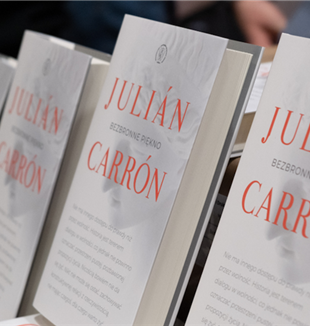
Poland: That "disarming beauty” that attracts
The presentation of the Polish edition of Julián Carrón's book in Wrocław. In the hall of the University of Economics, filmmaker Krzysztof Zanussi, Bishop Andrzej Siemieniewski and Professor Bogusław Fiedor spoke in dialogue.Wrocław, January 9, The University of Economics and Business. Marek Biernacki welcomed the audience to the presentation of the Polish edition of Julián Carrón's Disarming Beauty. Biernacki recalled the historic conference on the encyclical Fides et Ratio, held in the same place, in which the same speakers participated: Andrzej Siemieniewski, auxiliary bishop of Wrocław, Professor Krzysztof Zanussi, filmmaker and philosopher, and Bogusław Fiedor, economist and former rector of the University. The presentation began with a piece by Heinrich Ignaz Franz von Biber, performed by violinist Joanna Walczak.
An initial question was posed, similarly asked when the book was published in Italy, in September 2015: “Do we Christians still believe that the faith given to us can attract those we meet with the fascinating force, with the charm, of its disarming beauty?"
"The ‘Disarming beauty’ of Christianity, which gives the book its title, is precisely this. It is not a selection of reflections on the history of CL, but a journey that enters into public dialogue and the deep wounds of modernity”, added the moderator. The Christian event can only be credible and arouse the interest of contemporary man when it is capable of awakening the self, reviving the self in all of its dimensions - reason, feeling, freedom - to enable it to face existence, with all its trials and problems.
But is the usefulness and novelty of Carrón's path for the "common man" of today? Siemieniewski responded by recounting the experience of a sick person, able to generate beauty in the hearts of the people around her. The miracle of a life thus becomes a "generator of vital energy, a source of hope and faith", a "place" where one can experience the concrete signs of Christ’s presence that Carrón speaks about.
Professor Fiedor, in turn, began with a quote from the book Flights by Polish Nobel Laureate Olga Tokarczuk: "The nocturnal brain is a Penelope unravelling the cloth of meaning diligently woven during the day”. With respect to Carrón’s book, “we must not unravel this cloth of meaning”, because faith, as described in the Disarming Beauty, can only be joyful. "When its presence penetrates the depths of our being, it fills life with joy. This is, ultimately, the litmus test: how many people do we know who are truly joyful? Without joy there is no generation, no presence, no novelty. Thus, it is joy that links the two questions, "how can we live?" and "what is our task in the world?"". The professor also took up, making it his own, the great question posed by Fr. Giussani, and referred to by Carrón in his book: "This is man’s choice: either he conceives of himself as free from the whole universe and dependent only on God or free from God and therefore the slave of every circumstance”.
Filmmaker Zanussi spoke, instead, of the relationship between Christianity and reason, between the childishness of the contemporary world and freedom: "To speak of beauty is to speak of something that makes a person mature, and to dream of beauty is what makes a human being grow". Moreover: "Our age deceives us with freedom and denies it to us ". Pope Benedict XVI, quoted by Carrón, states that Europe's problem of finding its identity could depend on the fact that today Europe has "two souls". On the one hand, there is abstract, anti-historical reason, which tends to have control over everything because it feels superior to all cultures, which wants to free itself from all traditions and cultural values in order to reach an abstract rationality. On the other hand, there is a soul that can be called Christian, which opens itself to all that is rational but remains attached to the roots that have given rise to this reality, which have built it on great values, on great intuitions, always on a basis of faith.
Zanussi also “spoke” about the modern concept of reason and the overcoming of its boundaries, as well as of human freedom, in his film Foreign Body. He discovered these themes in Carrón's book. Modern humanistic disciplines, he said, perceive the world as a building made of Lego bricks, where all the elements fit together, as if the world "went on without the Mystery". Instead, as Einstein said, "he who does not perceive the Mystery is blind and deaf.”
Professor Fiedor was asked a question about the academic world and its nature with respect to concepts such as "reason" and "knowledge". In Polish universities "the task of education is increasingly forgotten: young people are trained in a specialized and functional way, thus eliminating subjects apparently unrelated to a certain specialization". Recently, however, and "fortunately", emphasizes Fiedor, a discussion has commenced about the need for the “positivist” current to advance in parallel with normative reflection. "We must also ask ourselves why and how things happen, not just how much”.
Siemieniewski further commented upon the situation and the path of the Church in Poland and the “beauty” that can illuminate it today. "Truth attracts because someone has communicated it," said the Bishop: "Truth is announced by someone, by an authority. The word authority comes from augere, which means to make something grow. It is this radiance of goodness and beauty that makes it grow". And that makes the encounter always possible.#DisarmingBeauty